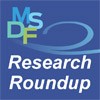MS Research Roundup: April 8, 2014
Medical Cannabis for MS; Rare Complication From Interferon-β; Genzyme to Try Again With Alemtuzumab; Retracted MS Paper
MS Research Roundup collects items of interest to multiple sclerosis researchers from around the Web. Send us your tips: tips@msdiscovery.org.
 Cannabis for MS
Cannabis for MS
There is good evidence that medical cannabis in the form of pills or a spray may ease symptoms of pain and spasticity in MS, according to a report from an American Academy of Neurology panel that reviewed evidence for various forms of complementary and alternative medicine. The treatment recommendations for MS were published on March 25 in the journal Neurology and may be among the first from a national medical organization to suggest that doctors might offer cannabis treatment to patients. Except for oral cannabis extracts and synthetic tetrahydrocannabinol, little evidence exists for the efficacy and safety of the 29 nonconventional treatments evaluated, including smoking cannabis, Vijayshree Yadav, the lead author of the guidelines and an associate professor of neurology at Oregon Health & Science University, told CNN. Regardless of the recommendations, clinicians cannot recommend cannabis to patients in states where it is illegal, Robert Fox, M.D., a neurologist at the Cleveland Clinic and author of the accompanying patient page, told CNN. (Los Angeles Times, CNN.com’s The Chart blog)
Interferon-β Side Effect Cluster
A handful of people taking a serum-free interferon-β formulation (Rebif/Merck) to treat multiple sclerosis have developed a serious condition that causes blood clots to form in small blood vessels throughout the body. An analysis of five cases shows that early manifestations of the potentially fatal side effect, known as thrombotic microangiopathy, may be detected by vigilant physicians, Scottish researchers reported March 27 in the New England Journal of Medicine. The important clinical features include newly diagnosed hypertension, hematologic abnormalities, and renal impairment. In 2009, the Rebif package insert included a warning about a possible association with thrombotic microangiopathy. Interferon-β is a widely prescribed recombinant-protein therapy with a well-established favorable safety profile, noted the authors, who also documented a recent bump in reports of the complication from countries that share the same formulation as that used in the United Kingdom. (US News & World Report)
Alemtuzumab: Second Time a Charm?
Genzyme, the Cambridge-based division of French drugmaker Sanofi SA, is forgoing an appeal (for now) and will resubmit its application to the U.S. Food and Drug Administration (FDA) by June for marketing Lemtrada for relapsing forms of MS (alemtuzumab). In December, the FDA denied approval for alemtuzumab, requesting additional data and stirring controversy. The drug was approved for MS in Canada, Europe, and Australia based on the same data. The U.S. approval of alemtuzumab was said to be a key factor in Sanofi’s purchase of Genzyme in 2011. Meanwhile, some investment funds are suing the French drugmaker, saying executives talked up alemtuzumab in public—and kept bad news from the FDA private. When asked by MSDF whether the company is submitting additional data, as requested by the FDA in December, spokesperson Erin Walsh replied in an email, “We are not providing details of the application’s content.” (Boston Business Journal, Boston Globe, FiercePharma, Genzyme)
RRMS Paper Retracted
A paper titled “Cognitive linguistic deficits in relapsing–remitting multiple sclerosis” has been retracted as part of an investigation into the work of two former University of Queensland, Australia, researchers, reports the Retraction Watch blog. The paper is the second to be retracted, following a university investigation of nearly 100 papers published by the researchers since 2007. The first retracted paper had to do with treating Parkinson’s disease with transcranial magnetic stimulation. In its statement of retraction for the MS paper, the journal Aphasiology writes that the university investigation established that “the manuscript claims to have a control group of 15, however, only 7 control participants were documented and some control data were re-used to enlarge the control group.” The paper’s retraction may not have a big impact on MS research. Retraction Watch notes that no one has cited it, according to Thomson Scientific’s Web of Knowledge. (Retraction Watch)
Read other MS Research Roundups.


